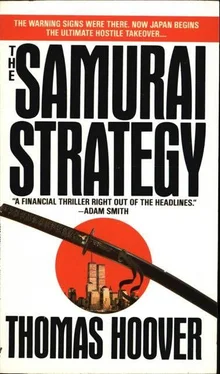Thomas Hoover - The samurai strategy
Здесь есть возможность читать онлайн «Thomas Hoover - The samurai strategy» весь текст электронной книги совершенно бесплатно (целиком полную версию без сокращений). В некоторых случаях можно слушать аудио, скачать через торрент в формате fb2 и присутствует краткое содержание. Жанр: Триллер, на английском языке. Описание произведения, (предисловие) а так же отзывы посетителей доступны на портале библиотеки ЛибКат.
- Название:The samurai strategy
- Автор:
- Жанр:
- Год:неизвестен
- ISBN:нет данных
- Рейтинг книги:5 / 5. Голосов: 1
-
Избранное:Добавить в избранное
- Отзывы:
-
Ваша оценка:
- 100
- 1
- 2
- 3
- 4
- 5
The samurai strategy: краткое содержание, описание и аннотация
Предлагаем к чтению аннотацию, описание, краткое содержание или предисловие (зависит от того, что написал сам автор книги «The samurai strategy»). Если вы не нашли необходимую информацию о книге — напишите в комментариях, мы постараемся отыскать её.
The samurai strategy — читать онлайн бесплатно полную книгу (весь текст) целиком
Ниже представлен текст книги, разбитый по страницам. Система сохранения места последней прочитанной страницы, позволяет с удобством читать онлайн бесплатно книгу «The samurai strategy», без необходимости каждый раз заново искать на чём Вы остановились. Поставьте закладку, и сможете в любой момент перейти на страницу, на которой закончили чтение.
Интервал:
Закладка:
He laughed. "Pardon me, Dr. Richardson, but diplomacy is merely the window dressing for reality. The world cares not a penny for diplomacy, only for power. No one troubled about the Persian Gulf states until they had OPEC and the rest of us had no petroleum. Then suddenly they were toasted worldwide as men of great moment. That is the meaning of 'diplomacy.'
"The reason I knew you would understand the importance of Ise," he went on, "is that, in your genes, you are part of us. You appreciate the value of harmony, one of the first teachings of our philosophy. There must be harmony between man and his world."
"What does that-?"
"Please, just allow me to finish. In like manner, there must also be harmony between nations. Yet all we hear about today is friction. Usually trade friction. Between our nations. But what can be done? The solutions we hear talked of seem, for reasons political and otherwise, impossible to implement. So what course does that leave? You speak of diplomacy, but already diplomacy has been shown inadequate. Why, we might ask, is that so? Because, as your Thomas Jefferson observed many years ago, money is the principal exchange of civilized nations. Diplomacy comes out of economic power. It was trade that estranged our two nations once before in this century, leading to a conflict neither of us desired, and it is money that creates these 'frictions' we hear about so much today. Since diplomacy has failed, we must now find other means to bring stability and thus harmony to both our nations."
She was tempted to ask him how all the right-wing, nationalistic fervor he was churning up with the sword would contribute to this so-called harmony, but instead she inquired what, specifically, he was proposing.
"The most pressing problem America has today, Dr. Richardson, is the growing inability of your industries to compete. If I may be allowed to generalize: America's strength has long been in innovation, but I think it is reasonable to suggest that Japanese management has had a commensurate share of success. So much so that we have been the subject of a flurry of books in your country." He smiled. "Even, I should add, several very insightful volumes written by you yourself. Also, Japanese industry has already been part of a number of joint ventures, instituting our management techniques in the service of America's business."
"Well, unquestionably we do have problems in our industrial sector just now," Tam interjected. "But Japan has plenty of difficulties of its own."
"Most assuredly." He nodded. "However, as some might put it, 'the proof is in the pudding.' I merely ask you to compare your, and our, balance of trade, or productivity. Surely these both suggest there is truth in what I say."
At that point Akira Mori abruptly seized the floor. "You know, Dr. Richardson, there are those in your country who are now saying your trade problems are caused by Japan. That we should work less, save less, squander more, just as you do. Perhaps so we will self-destruct economically as America is now doing and no longer be an embarrassment to you."
"That is hardly-" Noda tried to break in, but she waved him aside.
"No, this needs to be said. I am tired of hearing Americans tell us to follow their example." She turned back. "Your media chastise us for our thrift and hard work, while your businessmen, who are happy enough to grow rich retailing the superior goods we make, refuse to invest their profits in modernizing their own factories. Instead they give themselves bonuses and Japan lectures."
At that she wound down, to the obvious relief of Noda and Ken. The outburst seemed to pass as quickly as it had come, but it succeeded in reinforcing Tarn's reservations about Akira Mori.
"So what exactly do you have in mind?" She looked back at Noda.
"Dr. Richardson, no one in Japan desires to see America's industrial base disintegrate. That is dangerous for the future, both yours and ours. Yet joint ventures and management seminars are too little, too late. We, and by 'we' I mean Dai Nippon, are determined to make a more structured contribution."
As he laid out his plan, she realized that Matsuo Noda had decided to play God. Still, in this world such things were possible; all it took was enough financial clout. If anybody doubted that, just remember OPEC.
But that was the last time around. Now Japan had the money. Maybe the oil billionaires of years past had no good idea what to do with their winnings, but Matsuo Noda had a very precise idea indeed.
The one remaining problem: he needed Tamara Richardson.
CHAPTER ELEVEN
In the aftermath of that evening down in Ise, Tam was convinced of only one fact. Nobody was giving her the straight story. Not Noda, not Mori, not Ken. And when she tried to talk supercomputers with MITI officials at the Kyoto conference. she again sensed she was hearing a runaround. Suddenly all she could get was Japan's public face, that version of reality Japanese executives call tatemae, superficial and soothing assurances, intended to promote the wa, harmony, so desirable in human affairs. When Japan doesn't care to give answers, hai no longer translates as "yes." It just means "I heard you."
Even more troublesome was the question of Ken. As best she could tell, he was merely a reluctant accomplice in Noda's grand design. But why was he going along with Dai Nippon if he was as apprehensive as he seemed? Ken, she concluded, knew a lot more about Matsuo Noda than he was saying.
So instead of giving them all an answer outright, she decided to spend a few days analyzing what she'd managed to piece together so far. As Noda had couched his proposition, it was simple: he was offering her a chance to do more than merely write prescriptions for America's economic recovery. She would guide it.
One thing, Matsuo Noda was no proponent of half measures. The way he laid out his scenario, it was visionary… no, revolutionary. After thinking over his proposal for a week, she still wasn't sure whether he was brilliant or a megalomaniac. Dai Nippon's program could conceivably change the course of world history, and the prospect of being at the helm of its juggernaut was seductive. All the same, what if Ken's hints were right? What if Noda did have something much grander in mind, something impossible even to imagine. When you ride the whirlwind, who's really in charge?
In between her visits to the conference she spent some time at DNI's Kyoto offices getting acquainted with Noda's operation-the computers, fiber-optic links, analysts. Very impressive. Although Dai Nippon was technically only a shell corporation, all Matsuo Noda had to do was pick up a phone to have at his disposal the expertise of any one of a hundred Japanese corporate brain trusts. Half of Japan's new high-tech movers, it seemed, owed him some kind of "obligation." Given that, and all the money, he could well be unstoppable.
Also, the austerity of Dai Nippon's offices reminded her once again that none of Japan's new power was accidental. The discipline of the samurai. It was almost as though this country had been in training for centuries, toughening itself through self-denial and work-as-duty to be ready for an all-out economic blitz. Now, finally, Japan had an edge on the entire world. More technology and more money.
Was Noda about to just give away that edge? The implausibility made her certain something was missing.
Late that Friday, the conference over, she and Ken packed their bags and checked out of the International. But after they'd shoved their way through the usual pandemonium in the lobby and hailed a cab, he gave the driver the name of a place on Shinmonzen Street, the antique district. Not the train station. When she tried to correct him, he waved his hand and said he'd arranged for a surprise.
"Tam, the International always leaves a bad taste in my mouth. It has nothing to do with Japan. It could be anywhere, just like some Hilton next to a freeway." He smiled and lightly patted her hand. "Let's not go back to Tokyo just yet. Please. This weekend let's stay at a place where nothing will exist but you and me, not even time."
Читать дальшеИнтервал:
Закладка:
Похожие книги на «The samurai strategy»
Представляем Вашему вниманию похожие книги на «The samurai strategy» списком для выбора. Мы отобрали схожую по названию и смыслу литературу в надежде предоставить читателям больше вариантов отыскать новые, интересные, ещё непрочитанные произведения.
Обсуждение, отзывы о книге «The samurai strategy» и просто собственные мнения читателей. Оставьте ваши комментарии, напишите, что Вы думаете о произведении, его смысле или главных героях. Укажите что конкретно понравилось, а что нет, и почему Вы так считаете.












